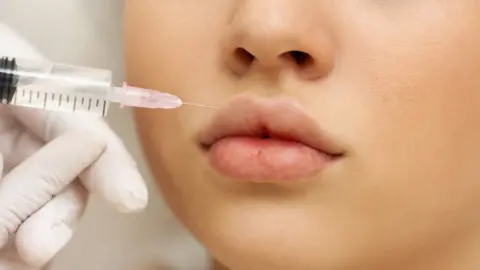Beauticians breaking the law on underage lip fillers
 Getty Images
Getty ImagesSome beauty practitioners are illegally offering lip fillers on social media, the BBC has found.
It is against the law for under-18s to receive dermal fillers for cosmetic reasons in England.
This includes making an appointment or agreeing to undertake the procedure for underage clients via online sites.
Following this investigation, Facebook says it has introduced measures which will make it harder for users to search for lip treatments.
Currently no qualifications are required to buy or inject filler, which can add volume and fill lines in areas like the lips or cheeks.
The age restriction was put in place two months ago to protect teenagers from an industry described as the "wild west".
Cosmetic doctors say aesthetic work for under-18s is "completely unnecessary" and can cause mental harm if things go wrong. Physical complications include infection, lumps, bruising, scarring and even blindness.
Breaking the law
The BBC investigated how the law was working by creating a Facebook profile named "Jennie May". It included a unique image of a 16-year-old girl generated by an Artificial Intelligence (AI) programme.
Facebook says listings on its Marketplace must not promote the sale of cosmetic procedures such as fillers. But "Jennie" was able to contact more than 200 practitioners.
The message requested a lip filler appointment so she could "feel confident" for her upcoming 17th birthday.
While the majority of the 184 respondents refused the request, more than one in five who replied said they were willing to treat underage "Jennie".
Responding to the BBC's findings, a Facebook spokesperson has confirmed "search terms" have now been "blocked" and listings which violate its guidelines will be removed.
Minister for Patient Safety and Women's Health, Maria Caulfield, says businesses are legally required to check the age of their clients, and anyone found not doing so will face prosecution.

Liv's story
Shortly before her school prom, 16-year-old Liv legally got lip fillers.
She had wanted the procedure for two years because she didn't like the fact that her gums were visible when she smiled.
Like the majority of patients, she found her practitioner on social media - a woman who was offering cheap treatments because she was still in training.
Liv says: "It did hurt, but afterwards the practitioner held the mirror up and I loved how they looked. She said, 'you're going to be addicted now'."
Now aged 19, Liv doesn't think she's addicted, but she has visited multiple practitioners for more lip treatments as well as getting filler injected into her cheeks, jaw and chin.
Some work was free or at a discounted price because she agreed to share her experiences with her tens of thousands of followers on social media.
"It'll usually be a lot cheaper and it's obviously directed at young people who probably have less money. It attracts them to come forward and be like, 'you can practice on my lips'."
On one occasion Liv was in so much pain that she cried and walked out of the appointment with filler only in her top lip.
She says it is wrong young girls are being used as "test dummies" and she now will only go to qualified practitioners.
Liv supports the ban, but understands the pressure teenagers feel to look a certain way.
"When I got my lips done at 16 it didn't feel wrong," she explains. "You look at someone getting all these likes on social media and you think 'I'm going to make myself look like that because that's what everyone wants me to look like.'
"There are filters that make your lips bigger and change your entire face. I can laugh about it more now. But if you are 15, they are so damaging."

'Outrageous'
Ashton Collins, Director of Save Face, a national register of accredited practitioners who provide non-surgical treatments, says it's "outrageous" that teenagers might still be offered the procedure.
"It's either absolute negligence or these practitioners are completely unaware. Either factor poses a significant risk to anybody they treat. These people should not be practising."
Laura Trott MP, who successfully called for the law change in Parliament, agrees: "This shows how necessary the law is and how important it is that we enforce it. There are individual, unscrupulous providers that we need to crack down on."
While under-18s are banned from getting dermal fillers or botulinum toxin injections - often known as Botox - in England, teenagers in Scotland, Wales and Northern Ireland are still allowed to.

Campaigners say the industry across the whole of the UK still has a long way to go.
Analysis by the Department of Health and Social Care suggests tens of thousands of filler procedures were being performed on under-18s every year, before the ban was brought in on 1 October.
There is no centralised data on complications, but Save Face says it has received more than 5,000 complaints over the past four years - and 70% of them related to fillers.
Founder of AMS Aesthetics, Amar Suchde, believes mandatory training should be required for all practitioners, to ensure they are "safe and ethical".
He has been injecting filler for nearly eight years, including 18 months of training.
"You need a lot of exposure and learning in this job," he explains. "You could treat 100 people and everything is fine. But the day something goes wrong, you need to act immediately to stop things escalating. You soon realise how important it is to understand your anatomy."
Earlier this year, a BBC Three documentary revealed complicated aesthetic procedures were being taught over the internet or on unsafe one-day courses.
From May 2022, adverts for cosmetic surgery which target under-18s, will be banned across the UK.
Other updates on the non-surgical beauty industry are expected in the near future in Wales and Scotland, while Northern Ireland has no current plans to make any changes.
